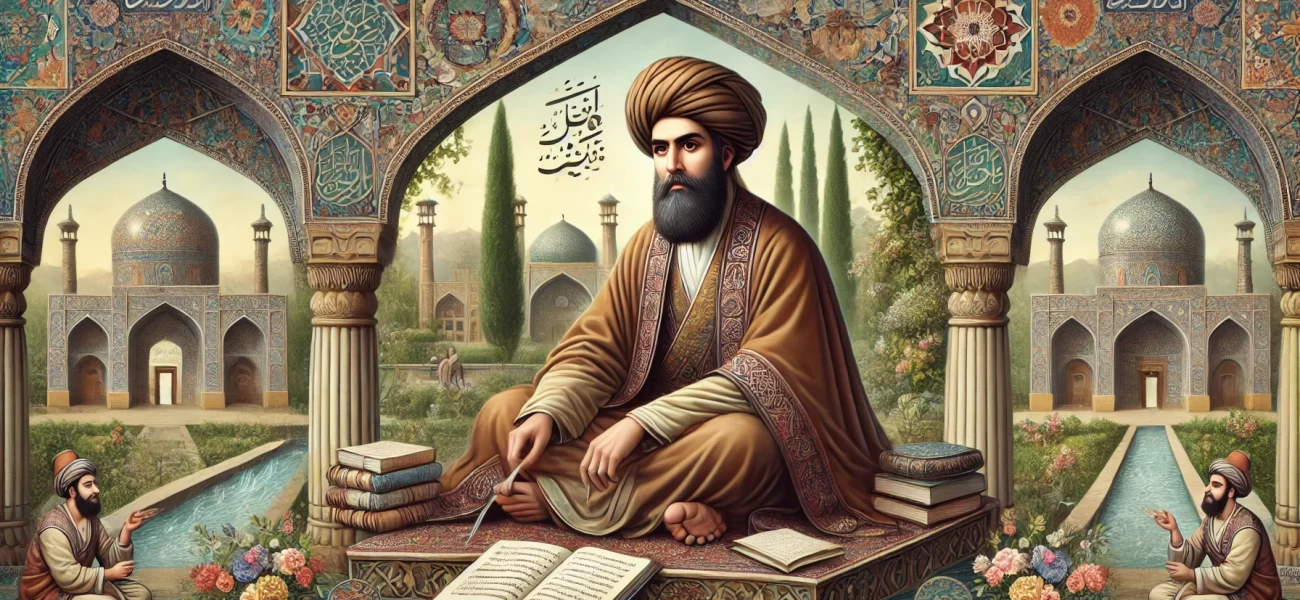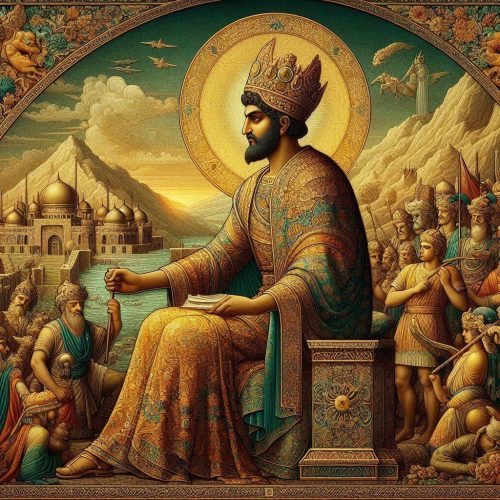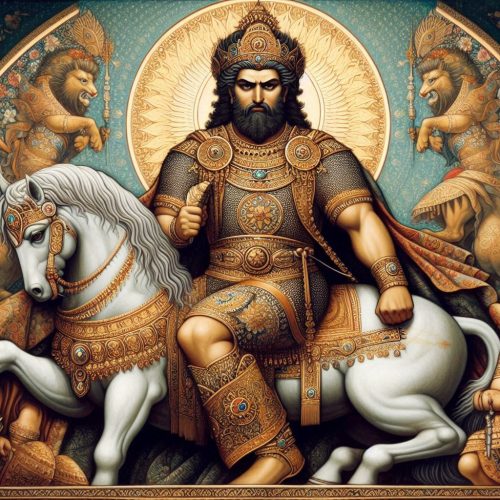Shahid Balkhi: The Radiant Beacon of Persian Wisdom and Poetry
In the vast tapestry of Persian literary history, certain figures stand as towering beacons of wisdom and creativity, their legacies woven deeply into the cultural fabric of the region. One such figure is Abul Hasan Shahid ibn Hussain al-Balkhi, known simply as Shahid Balkhi, a philosopher-poet whose luminous intellect and profound verses have endured the passage of time. Born in the 9th century in Balkh, a region renowned for its vibrant cultural and intellectual milieu, Shahid Balkhi’s life and work epitomize the flowering of Persian literature and thought during the Islamic Golden Age.
This article embarks on a journey through the life of Shahid Balkhi, exploring the depths of his philosophy, the elegance of his poetry, and the enduring legacy that continues to inspire scholars, poets, and lovers of Persian culture. It is a journey that seeks not only to chronicle the events of his life but also to capture the essence of his thought and the soul of his poetry—a soul that transcends time, echoing across the centuries with a voice that is both timeless and universal.
Life: A Scholar’s Path in the Heart of Khorasan
Shahid Balkhi was born in the early 9th century, around 849 CE, in the city of Balkh, situated in what is now northern Afghanistan. Balkh, often referred to as the “Mother of Cities” (Umm al-Bilad) in Islamic literature, was a melting pot of cultural, religious, and intellectual activity. This city, steeped in history and tradition, was the cradle of many great minds who contributed to the Islamic and Persian renaissance. Shahid Balkhi’s birth in such a fertile intellectual environment laid the foundation for his future endeavors as a scholar, poet, and philosopher.
From a young age, Shahid was immersed in the study of various sciences, including theology, philosophy, literature, and medicine. His education was comprehensive, covering both the religious sciences (ulum al-din) and the rational sciences (ulum al-aql). This dual approach to learning was typical of scholars in the Islamic Golden Age, reflecting a belief in the harmony between faith and reason. Shahid Balkhi’s education was further enriched by his exposure to the teachings of Sufism, which infused his work with a deep spiritual dimension.
Despite his rigorous scholarly pursuits, Shahid Balkhi was not confined to the cloistered halls of academia. He was deeply engaged with the world around him, traveling extensively across the Khorasan region and beyond. These travels not only broadened his intellectual horizons but also provided him with a rich tapestry of experiences that would later be reflected in his poetry and philosophical writings. His interactions with other scholars, poets, and thinkers of his time played a crucial role in shaping his intellectual outlook and creative output.
Shahid Balkhi’s life, however, was not without its share of challenges. The political and social upheavals of the 9th century, marked by the decline of the Abbasid Caliphate and the rise of regional dynasties, created an atmosphere of uncertainty and instability. Yet, it was within this context of turmoil and change that Shahid Balkhi’s voice emerged as a beacon of wisdom, offering insights that transcended the vicissitudes of his time.
His death in 934 CE, under mysterious circumstances, only added to the mystique surrounding his persona. Some accounts suggest that he was martyred—hence the epithet “Shahid” (the Martyr)—due to his outspoken views on social justice and his criticism of the political establishment. Others believe he died of natural causes. Regardless of the circumstances of his death, Shahid Balkhi’s legacy as a scholar, poet, and philosopher has remained intact, his works continuing to inspire generations of thinkers and writers.
Philosophy: The Fusion of Faith and Reason
Shahid Balkhi’s philosophical outlook was deeply rooted in the intellectual traditions of his time, particularly the teachings of Islamic philosophy and Sufism. His philosophy represents a synthesis of rational inquiry and spiritual insight, reflecting a profound belief in the unity of knowledge. For Shahid Balkhi, the pursuit of wisdom was not merely an intellectual exercise but a spiritual journey that led to the realization of divine truths.
At the core of Shahid Balkhi’s philosophy is the concept of Tawhid, the oneness of God, which serves as the foundation of his metaphysical worldview. He believed that all of creation is a manifestation of the divine, and that the purpose of human existence is to recognize and realize this divine unity. This recognition, however, is not achieved through mere intellectual understanding but through spiritual purification and inner transformation.
Shahid Balkhi’s philosophical writings emphasize the importance of self-knowledge as the key to understanding the divine. He often quoted the famous hadith, “He who knows himself, knows his Lord,” to illustrate the intimate connection between self-awareness and the knowledge of God. For him, the human soul was a microcosm of the divine, and by delving into the depths of one’s soul, one could uncover the hidden truths of the universe.
His philosophy also addressed the nature of the human condition, particularly the tension between the material and spiritual aspects of existence. Shahid Balkhi viewed the material world as a transient illusion, a “veil” that conceals the true reality of the divine. Yet, he did not advocate for the rejection of the material world; rather, he called for a balanced approach, where one engages with the world without becoming attached to it. This balanced approach is reminiscent of the Sufi concept of “fanaa” (annihilation of the self), where the ego is transcended in the quest for divine union.
In addition to his metaphysical explorations, Shahid Balkhi also engaged with the ethical dimensions of philosophy. He believed that the pursuit of virtue was integral to the philosophical life, and that ethical conduct was a reflection of one’s inner spiritual state. His ethical teachings emphasized compassion, humility, and justice, values that he believed were essential for both personal and social well-being.
Shahid Balkhi’s philosophy was not confined to abstract theorizing; it had practical implications for the individual and society. He was particularly concerned with issues of social justice and the moral responsibilities of rulers. In his view, political authority was a trust from God, and rulers were accountable to both God and their subjects. He was critical of tyrannical rulers who abused their power, and he advocated for a just and compassionate governance that upheld the rights and dignity of all individuals.
Poetry: The Voice of the Soul
If Shahid Balkhi’s philosophy was the product of his intellect, his poetry was the expression of his soul. His verses, though fewer in number compared to his contemporaries, are celebrated for their depth, elegance, and spiritual resonance. Shahid Balkhi’s poetry reflects the themes of his philosophical thought—divine love, the nature of existence, and the quest for self-knowledge—yet it does so in a language that is both accessible and profound.
His poetic style is characterized by a simplicity of expression that belies the complexity of the ideas conveyed. Shahid Balkhi’s verses are often imbued with a sense of longing, a yearning for the divine that is at once personal and universal. This yearning is expressed through rich imagery drawn from nature and everyday life, which he uses as metaphors for spiritual truths. For instance, the image of the nightingale longing for the rose, a recurring motif in Persian poetry, is employed by Shahid Balkhi to symbolize the soul’s desire for union with the divine.
One of the central themes of Shahid Balkhi’s poetry is the impermanence of the material world. He frequently reminds his readers of the fleeting nature of worldly pleasures and the inevitability of death, urging them to seek what is eternal and true. This theme is poignantly captured in the following lines:
“The world is but a fleeting dream, a mirage that fades at dawn,
Seek not the treasures of this earth, for they are dust, blown by the wind.”
In these verses, Shahid Balkhi encapsulates the essence of his spiritual philosophy—the recognition of the transient nature of the material world and the pursuit of the eternal. His poetry, therefore, serves as a guide for those who seek to transcend the illusions of the world and attain spiritual enlightenment.
Another striking aspect of Shahid Balkhi’s poetry is its contemplative tone. His verses often read like meditations, inviting the reader to pause and reflect on the deeper meanings of life. This contemplative quality is evident in the following quatrain:
“In the silence of the night, when the world is at rest,
I wander through the garden of my soul, searching for the truth,
Each star that glimmers in the sky is a sign,
A whisper from the divine, calling me home.”
Here, Shahid Balkhi captures the stillness and introspection that are central to the spiritual quest. The night, a symbol of both mystery and revelation, becomes a backdrop for the soul’s journey toward self-discovery and divine realization.
Despite the spiritual and philosophical themes that dominate his poetry, Shahid Balkhi’s verses also reflect his deep concern for social issues. He often used his poetry to critique the injustices of his time, particularly the corruption and tyranny of rulers. His poems are infused with a sense of moral urgency, calling for justice, compassion, and integrity. In this sense, Shahid Balkhi’s poetry is not only a reflection of his personal spiritual journey but also a vehicle for social critique and reform.
Legacy: The Enduring Influence of Shahid Balkhi
The legacy of Shahid Balkhi is one that transcends the confines of time and space, reaching across centuries to inspire scholars, poets, and thinkers not only in Iran but throughout the Persian-speaking world. His contributions to Persian literature and Islamic philosophy are widely recognized, and his works continue to be studied and revered by those who seek to understand the profound intellectual and spiritual currents that shaped the Islamic Golden Age.
One of the most significant aspects of Shahid Balkhi’s legacy is his role in the development of Persian poetry. Though he may not be as widely known as later poets like Rumi or Hafez, Shahid Balkhi’s work laid the groundwork for the flourishing of Persian mystical poetry. His emphasis on spiritual themes, his use of metaphor and symbolism, and his contemplative tone were all elements that influenced the subsequent generations of Persian poets. In this sense, Shahid Balkhi can be seen as a precursor to the great Sufi poets who would follow in his footsteps, expanding and deepening the spiritual and philosophical dimensions of Persian poetry.
In addition to his influence on poetry, Shahid Balkhi’s philosophical ideas have had a lasting impact on Islamic thought. His synthesis of rational inquiry and spiritual insight has been echoed in the works of later Islamic philosophers, particularly those associated with the Ishraqi (Illuminationist) tradition. Shahid Balkhi’s emphasis on self-knowledge, the unity of being, and the ethical dimensions of philosophy are themes that have resonated with Islamic thinkers across the centuries, contributing to the rich and diverse tapestry of Islamic philosophy.
Shahid Balkhi’s legacy is also evident in the realm of Sufism. His writings and poetry reflect the influence of Sufi thought, particularly in their emphasis on the inner journey of the soul toward God. While it is difficult to classify Shahid Balkhi as a Sufi in the formal sense, his works undoubtedly contributed to the spiritual and intellectual milieu that gave rise to the Sufi tradition. His focus on the purification of the soul, the recognition of the divine in all things, and the critique of worldly attachments are themes that align closely with Sufi teachings.
Moreover, Shahid Balkhi’s legacy extends beyond the literary and philosophical domains into the realm of social thought. His critique of political tyranny and his call for justice and compassion have made him a figure of enduring relevance in discussions of ethics and governance. In an age where the relationship between power and morality continues to be a subject of intense debate, Shahid Balkhi’s ideas offer a perspective that is both timeless and deeply rooted in the Islamic intellectual tradition.
In contemporary Iran and the wider Persian-speaking world, Shahid Balkhi’s legacy is celebrated through various cultural and academic initiatives. His works are studied in universities, his poetry is recited in literary gatherings, and his ideas are explored in philosophical and theological discussions. In this way, Shahid Balkhi remains a living presence, his voice continuing to resonate with those who seek to understand the deeper meanings of life and the complexities of the human condition.
A Timeless Voice in Persian Literature
Shahid Balkhi’s life and work stand as a testament to the enduring power of wisdom and poetry. In a world often dominated by fleeting concerns and material pursuits, his words offer a reminder of the eternal truths that lie at the heart of human existence. His philosophy, grounded in the unity of faith and reason, invites us to explore the depths of our own souls and to recognize the divine in all things. His poetry, with its simplicity and profundity, speaks to the universal longing for truth and beauty that transcends the boundaries of time and culture.
As we reflect on the legacy of Shahid Balkhi, we are reminded of the rich intellectual and spiritual heritage that he represents—a heritage that continues to inspire and enlighten those who seek to follow the path of wisdom. In Shahid Balkhi, we find not just a poet and philosopher, but a guide—a beacon of light that shines across the ages, illuminating the way for those who seek to understand the mysteries of life and the divine.
In the words of Shahid Balkhi himself:
“The world may fade, and time may pass,
But the light of truth shall ever last,
In every heart that seeks to know,
The secrets of the eternal glow.”
These words, like the man who penned them, remain a source of inspiration, a reminder that the quest for truth and wisdom is a journey without end—a journey that, in its essence, is the very purpose of our existence.




